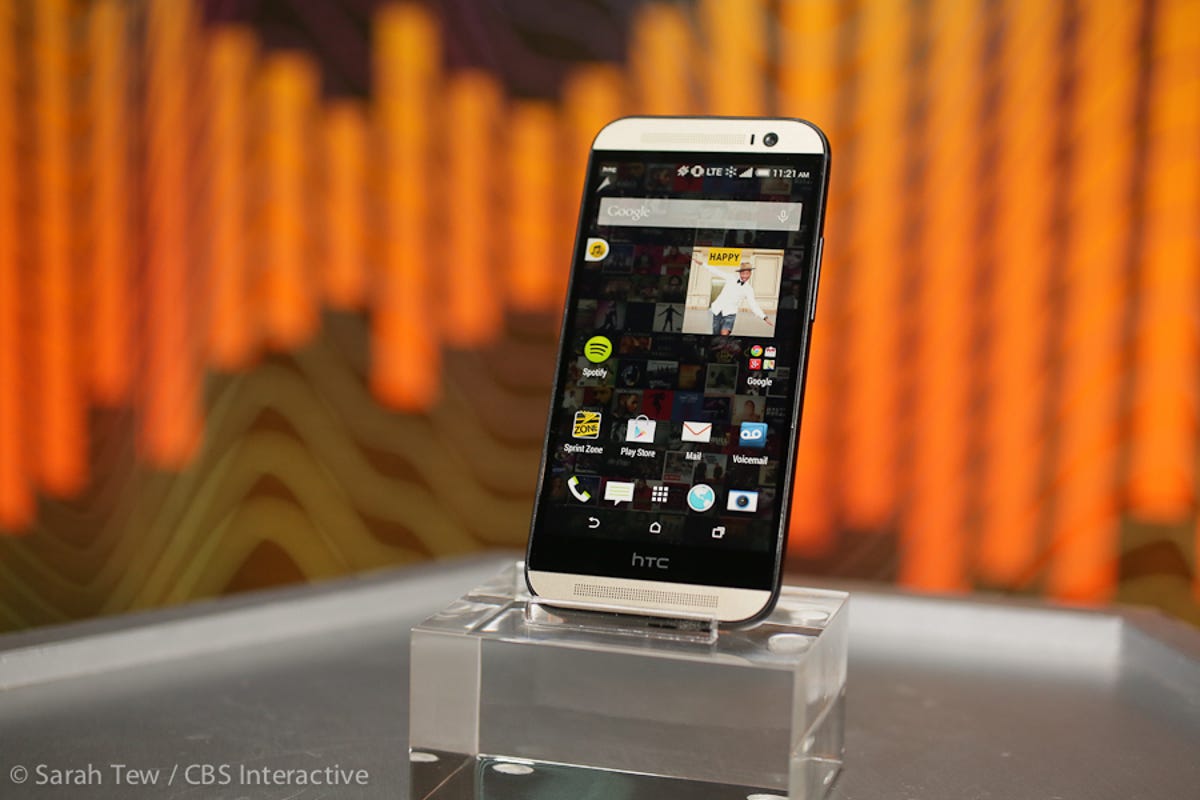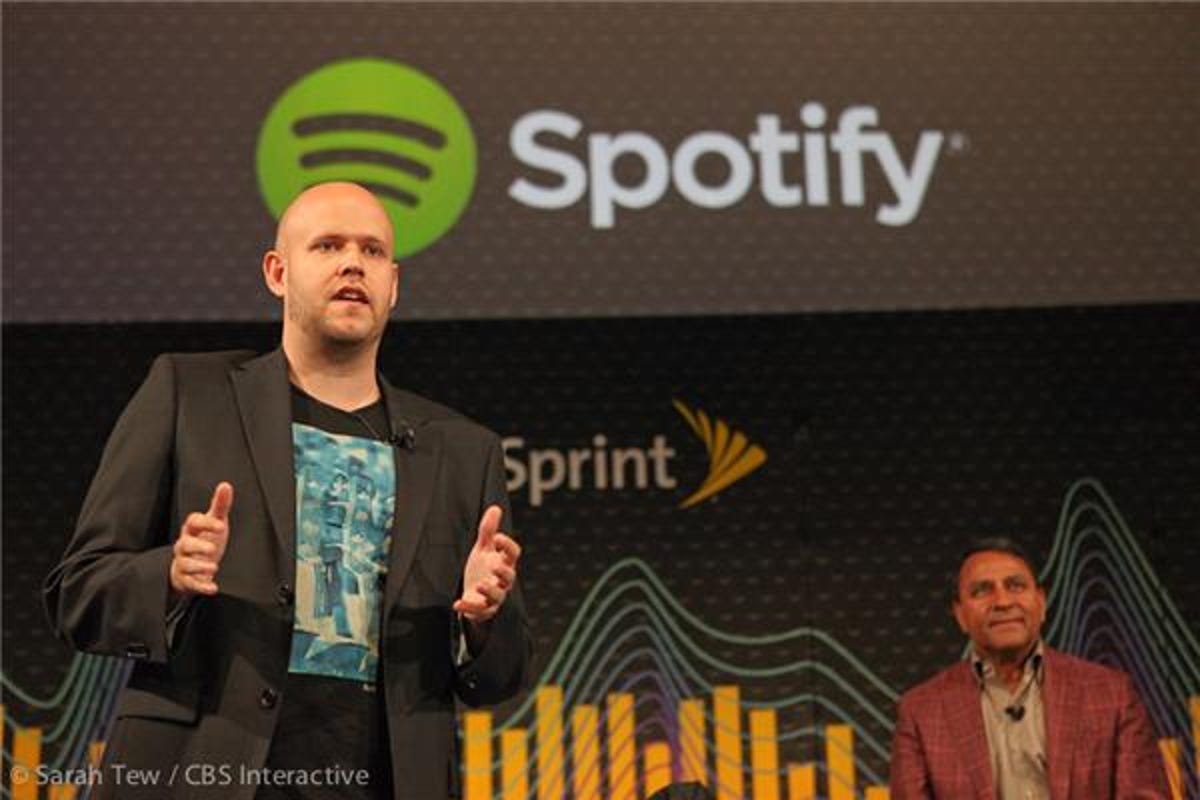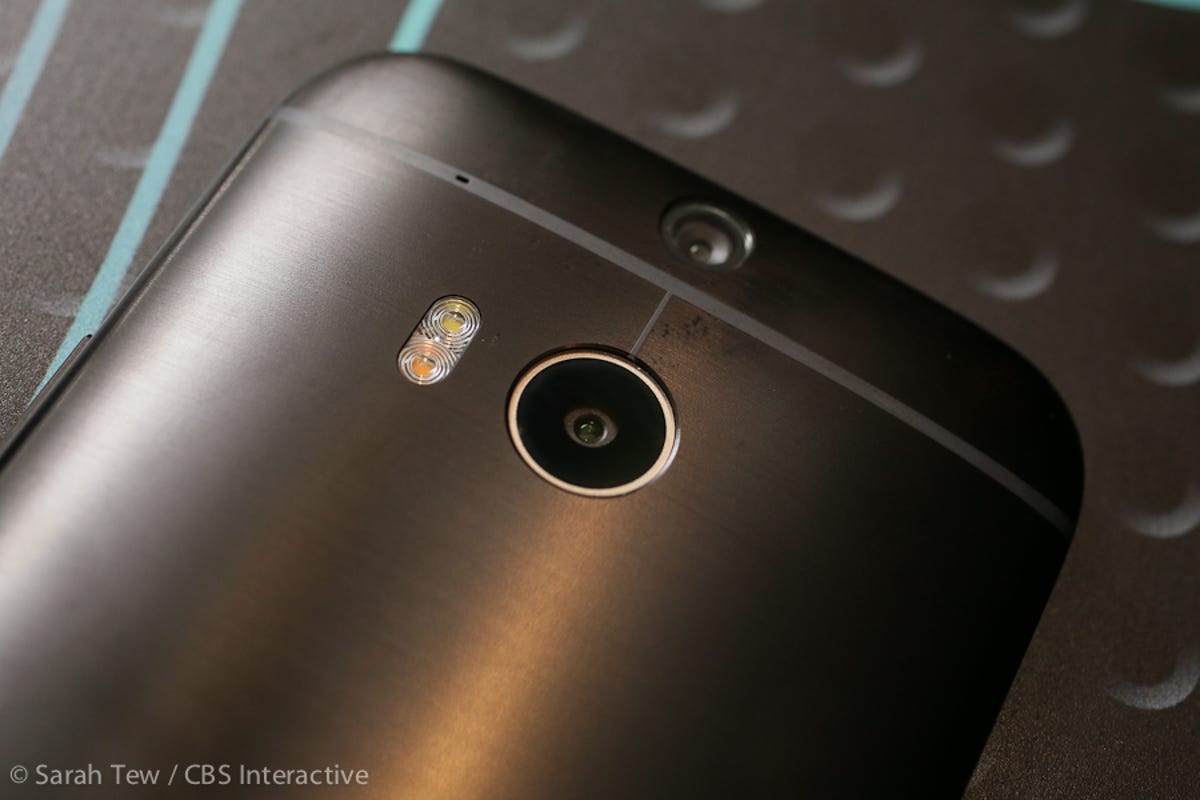
Sarah Tew/CNET
Sprint has something it thinks is worth a listen.
On Tuesday, the carrier announced a deal with Spotify to bring six months of free premium service to customers who sign up for its Framily friends and family program. It also pulled the wraps off the HTC One M8 Harman Kardon edition, a device that promises superior audio technology from Harman.
At a time when the wireless carrier continues to bleed customers, Sprint could use every advantage it can get. The company is hoping the customized version of the HTC One M8, which CNET gave a glowing review to, will help Sprint set itself apart.
The club-like atmosphere of the press conference was a bit of a contrast with Sprint’s earnings report just a few hours before, which saw it post a narrower loss, but the loss of nearly half a million customers. Most distressing was the continued drop-off in so-called post-paid customers, who typically have higher credit scores and are deemed the most valuable consumers.
But none of that was mentioned at the event, which was fixated on all things audio. CNET breaks down the Spotify partnership and looks at whether Harman Kardon and HTC’s audio really justifies the hype.
So what’s going on with Sprint and Spotify?
Sprint will offer six months of free premium Spotify service to customers who sign up for its Framily friends and family plan. After the first six months, customers can keep the service at a discounted rate. The deal starts on May 2.
Like Framily, in which the monthly rate plan drops as more customers join, Spotify has two different tiers of pricing depending on how many people are in the program with you. For Framily plans with one to five people, the discounted service is $8 a month, while a plan with six to 10 people each pay $5 a month.


Sarah Tew/CNET
After 18 months, the discount ends and customers have to pay the full $10 to keep Spotify premium.
New Sprint customers who don’t opt in to the plan get Spotify for three months, after which they have to pay the typical rate.
Sprint says there is an alert that pops up at the end of the trial period telling customers that they will have to start paying for Spotify. Customers have to actively cancel the service once the trial ends, or they will start getting charged automatically through Sprint.
Why is this important for Spotify?
For Spotify, the deal represents the first time it has been able to nab a carrier partner to help push its service.
Spotify Chief Content Officer Ken Parks called it the largest telco deal for the company. While he declined to comment on how many customers are paying for Spotify now, the company had previously disclosed 6 million premium subscribers. Sprint brings a potential customer base of 53.6 million.
It’s been more than a year since Spotify has offered up any solid customer metrics, but Parks hinted that an update might come in the near future.
The deal is also important because an upstart rival, Beats, launched its music service with a similar — and exclusive — agreement with AT&T. As a result, the Beats Music service is heavily promoted at AT&T stores. Spotify’s pact with Sprint demonstrates it can keep pace, although AT&T offers nearly twice as large a customer base.
Parks wouldn’t comment on potential deals with other carriers — such as the similarly large Verizon Wireless — but said Sprint made an appropriate partner because of its shared passion for music and sound quality.
And there’s a new phone?
Well, not exactly. HTC created a custom version of its recent flagship HTC One M8, called the Harman Kardon edition. The phone, which comes with a special black back finish and champagne highlights, has special software from Harman that enables superior audio quality.


Sarah Tew/CNET
Aside from the custom finish, HTC didn’t change the hardware for this version of the device; it merely added software and tuned the speakers a bit. HTC CEO Peter Chou told CNET that the company began working with Harman Kardon four to five months ago on the device.
“It’s a big deal,” he said.
The Harman Kardon edition of the HTC One M8 is its way of taking a phone that is found on every carrier and customizing it a bit to stand out, Sprint Chief Marketing Officer Jeff Hallock told CNET. He hinted that it is a strategy that the carrier would like to continue with other mass-marketed phones, but wouldn’t provide any details.
When and where can I get this phone?
The HTC One M8 Harman Kardon (even CEO Dan Hesse joked it was a mouthful during the presentation) will be available on May 9 at Sprint stores and sell for $230 on contrac,t or $28.34 in 24 monthly installments.
The phone comes with Harman Kardon AE-S in-ear buds, which are valued separately at $149.
How does the audio technology work?
Harman developed two pieces of software. The first, Clarifi, is the key technology that improves the quality of music.
Most digital music is sent over in a compressed form, losing as much as 90 percent of the data along the way. As a result, the song isn’t as clear or crisp as what the artist intends.
Related stories
- Sprint introduces its exclusive HTC One M8 Harman Kardon ediion
- Sprint’s bleeding continues: Loss narrows even as more customers defect
- Framily’s a hit? Sprint CEO calls it fastest growing plan ever
- Beats Music to launch January 21, with AT&T as its front man
Clarifi aims to restore much of that lost data through Clarifi. The software is an algorithm that can look at compressed songs and compare it to original and HD tracks to restore bits of data, getting it back up to 90 percent of its original sound.
The second software, Livestage, works to separate the reverb, percussion, and vocals and puts them in their correct positions, as if they were performing on a virtual stage. It works best if the song has to have multiple instruments or singers performing at once. It also works best with headphones.
Simply put, the audio quality is supposed to be superior to a CD.
Harman isn’t the only one working to improve audio quality. Legendary rocker Neil Young is trying to use Kickstarter funding to build his PonoMusic player, which is supposed to offer an audio format that delivers uncompromised music.
Is this the same as Sprint’s HD Voice service?
Sprint offers a separate feature, HD Voice, for customers who have compatible phones. It likewise boasts a superior audio experience, but for phone calls. It only works between phones that are both HD Voice-capable. Sprint said the nationwide launch of its HD Voice service will occur by mid-year, and that it expects to have 20 million customers on HD Voice by the end of the year.
But HD Voice is different from Harman Kardon’s Clarifi technology, which really only applies to music.
Does Clarifi cost anything?
No. It’s embedded into the HTC One’s Harman Kardon edition.
Does this only work with Spotify?
No. The technology can be applied to any streaming music service or music stored on the HTC One M8 Harman Kardon edition.
Bottom line: Is it any good?
Yes, but you’ll need to be an audiophile to really appreciate the difference.
“Clarifi is not hype,” said Avi Greengart, an analyst for Current Analysis. “It’s not dramatic either. It’s a subtle, but real improvement.”
A personal test on the smartphone found the audio quality to be a little louder, with a bit more detail, but the experience wasn’t mind-blowing. I, admittedly, am not the most sophisticated listener of music. (My audio accessories range from free Apple earbuds to Bose noise-cancelling headphones.)
Individuals are likely to have dramatically different experiences based on their listening habits.
I’m not a Sprint customer. Can I get this anywhere else?
For now, the HTC One M8 Harman Kardon is an exclusive to Sprint. Harman’s Clarifi is likewise locked down with the carrier.
But Harman CEO Dinesh Paliwal told CNET that he is open to bringing Clarifi technology to other carriers, and has been speaking to chipmakers to embed the software into mobile processors.
He added he hasn’t yet spoke to AT&T or Verizon, and feels it is better to get a single phone in the market demonstrating the technology. Sprint offered the quickest route to market.
Ultimately, he hopes to license Clarifi to other companies, and added he sees an opportunity in the carriers themselves offering high-quality audio as a premium service using his technology.
“It’s natural to think it would expand to other places,” he said.



